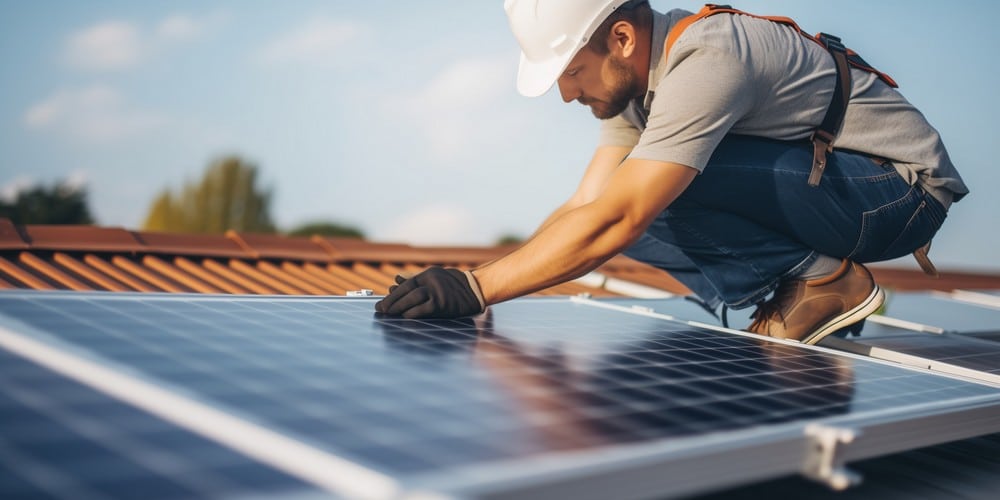
Are you tired of high electricity bills and looking for a way to save money while helping the environment? Installing solar panels in your home could be the answer.
With generous incentives from the United States government and other similar entities, as well as the potential for big savings, there’s never been a better time to go solar than today. Here’s what you need to know.
Federal Tax Credit Pays You Back
One of the best incentives for going solar is the federal solar tax credit. It allows you to deduct a certain percentage of the cost of installing a solar energy system from your federal taxes. For example, if your solar panel system costs USD$20,000, you’d be able to claim a USD$6,000 credit on your taxes if you’re granted 30% off.
Tax benefits for solar owners depend on each person’s situation. It’s best to consult with a professional solar company to find out how much savings you’ll be able to get from the federal government if you go with solar panels.
Savings can be applied to the associated installation costs, including labor, permitting fees, and even energy storage devices. This means you can claim the credit on pretty much your entire solar project cost, depending on your situation.
State And Local Incentives Sweeten The Deal
In addition to the federal tax credit, many states, counties, and cities offer their own incentives for going solar. It’s believed that solar incentives in Washington are a perfect example of how would-be solar panels can enjoy local support. Benefits can include:
- Cash rebates that directly offset a portion of your installation costs.
- Additional tax credits on your state income taxes. Some states offer tax credits on your system cost.
- Solar Renewable Energy Certificates (SRECs) that allow you to sell the ‘green’ attributes of the electricity your solar panels generate to your utility. SREC prices can vary; hence, it’s best that you get in touch with your state’s solar energy authorities for the most accurate information about the savings you’ll be able to receive.
- Property and sales tax exemptions. Many states exempt the value of solar installations from property taxes, and some also waive sales taxes on solar equipment.
- Expedited permits and fee waivers to make installing solar faster and cheaper. Some areas offer same-day solar permits and have waived their building and planning fees for solar projects.
Incentives vary widely by location, so be sure to research what’s available in your area. Databases and websites are great places to start. Your solar installer and state energy office can also help you navigate local incentives.
Savings Add Up Over Time
Even sans incentives from the authorities, installing solar can lead to big savings on your electricity bills. When your solar panels produce more electricity than you use, that extra energy is sent to the grid and your utility company typically credits you for it at the retail rate, an arrangement known as net metering.
How much you can save with solar depends on factors like electricity rates in your area, how much sun your roof gets, the size and orientation of your system, and your household’s energy usage patterns. But the average U.S. home can expect to save more than a thousand dollars a year on electricity by going solar. Over a 20-year period (the typical lifespan of a solar panel system), that adds up to over a few tens of thousands in savings.
In some states with high electricity costs, lifetime savings can be even higher. And these figures don’t even account for solar incentives, which reduce costs further. When you factor in incentives and the increased home value from solar panels, going solar often pays for itself many times over.

Available Financing Options Make Solar Affordable
If the upfront cost of solar is holding you back, keep in mind there are many financing options that can make solar affordable with little to no money down. You can take out a solar loan to pay for your system and use your incentives and electricity savings to pay off the loan over time. Many solar loans today have low interest rates and low or even no upfront costs.
Another popular option is a solar lease or power purchase agreement (PPA). With these arrangements, the solar company owns and maintains the panels on your roof and you simply pay them a fixed monthly amount for the electricity the panels generate, usually at a lower rate than what you’d pay your utility. This way, you can start saving on day one without having to shell out any money for the panels. The downside is you won’t get to keep all the long-term savings since the solar company owns the system.
A third option is a Property Assessed Clean Energy (PACE) loans. PACE loans offer low interest rates and long terms, making for affordable monthly payments. And because PACE loans are tied to your property tax bill, you can usually transfer the remaining balance to the next owner if you sell your home before paying off the loan.
Join Your Neighbors In The Solar Revolution
Going solar isn’t just a savvy financial move – it’s also a way to join a growing movement of energy empowerment. In the last decade, solar has experienced a stellar average annual growth rate that’s driven largely by the residential sector.
As more households go solar, it helps build a cleaner, more resilient electricity grid for everyone. Distributed solar reduces strain on the grid, minimizes power losses from long-distance transmission, and makes the grid less vulnerable to disruption. Rooftop solar also democratizes energy production and gives consumers more control over where their electricity comes from.
By going solar, you’ll be in good company, with everyone from your neighbors to major corporations and government agencies embracing solar. You’ll also be making a powerful statement about the future you want to see – one where energy is clean, local, and accessible to all.
Do Your Research And Get Started With Solar Today
Although the benefits of going solar are compelling, it’s important to do your due diligence. Solar is a significant investment, so you’ll want to research your options thoroughly and make sure you understand the details before signing anything.
Get quotes from multiple reputable solar installers and compare not just prices but also the quality of equipment they use, their experience and track record, warranties and maintenance plans, and financing options. Read customer reviews, check for proper licensing, and make sure any quote includes all costs with no hidden fees.
To Conclude
With a combination of lucrative incentives, proven savings, and flexible financing, there’s never been a better time to go solar than today. By joining the growing solar community, you’ll save money, gain energy independence, boost your home’s value, and help build a cleaner, brighter future for us all.
Making the switch to solar is one of the single most impactful things you can do to reduce your energy bills and your carbon footprint. Now is the moment to seize solar power – for your wallet, for your home, and for generations to come.








